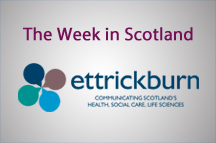 For the last six months, Scottish Conservative leader, Ruth Davidson MSP, has implored First Minister, Nicola Sturgeon, to ‘get on with the day job’.
For the last six months, Scottish Conservative leader, Ruth Davidson MSP, has implored First Minister, Nicola Sturgeon, to ‘get on with the day job’.
Ms Davidson’s charge is that the SNP Scottish Government is more interested in picking fights with the UK Government over a future referendum on independence, than in addressing the needs of, for instance, Scotland’s NHS and schools.
Last week Ms Sturgeon came to parliament to fight back, armed with statistics suggesting it was the Conservatives who have been most ‘obsessed’ with the constitution having mentioned it 153 times in recent press releases compared to twelve mentions of education and one for health.
The problem is that the ‘day job’ of the Scottish Parliament is being eclipsed by the UK General Election and the battle for seats in a parliament that does not look after the majority of the day to day issues that affect people in Scotland such as health and social care, education, transport, environment, justice or culture.
So, instead of concentrating on policy, the Scottish Conservatives want the General Election to be about sending a ‘clear message’ that ‘we don’t want another vote on independence’.
 It’s an approach that served the Conservatives well in the recent local council elections and this week I received a glossy leaflet from Ruth Davidson telling me that my vote in June is a vote ‘to stop the SNP threatening our future with Sturgeon’s push for another independence referendum’. Across the leaflet’s four A4 pages there were two mentions of Brexit (give Theresa May a strong hand in negotiations) but no mention of things that the UK government decides that affect Scots such as taxation, benefits or defence.
It’s an approach that served the Conservatives well in the recent local council elections and this week I received a glossy leaflet from Ruth Davidson telling me that my vote in June is a vote ‘to stop the SNP threatening our future with Sturgeon’s push for another independence referendum’. Across the leaflet’s four A4 pages there were two mentions of Brexit (give Theresa May a strong hand in negotiations) but no mention of things that the UK government decides that affect Scots such as taxation, benefits or defence.
Nicola Sturgeon for her part might not complain too bitterly if the election turns into a bit of a referendum, though she might prefer it to be on an issue where the numbers are more clearly on her side, such as Brexit, rather than independence. At the moment, the SNP’s key focus is on painting a vision of Thatcherism 2 if Mrs May was to achieve a big majority.
With nearly three weeks and a series of launches and leadership debates to go, it is still possible that Scottish voters will be offered a broader menu of issues, ideas and policies on which to make their choice on 8 June.
What is unlikely to change in Scotland any more than anywhere else in the UK, is the belief, however flawed, that voters choose leaders first, then their parties and policies second. So, in the same way as we see a big blue ‘Theresa May for Britain’ bus with little party logos on the front doors, the Scottish electorate will hear daily from Nicola, Ruth, Kezia [Dugdale, Labour], Patrick [Harvie, Green] and Willie [Rennie, Liberal Democrat], rather than from colleagues actually standing for election to Westminster.
All the above party leaders are members of the Scottish Parliament. Indeed, at ground level, every MSP is being expected to pitch in with local campaigning as, much of the time, they are better recognised that their Westminster counterparts.
Apart from election day in June, the Scottish Parliament is open for business as usual during the UK General Election. But the truth is that, until then, none of its members will be concentrating as much as normal on the day job of being an MSP.














